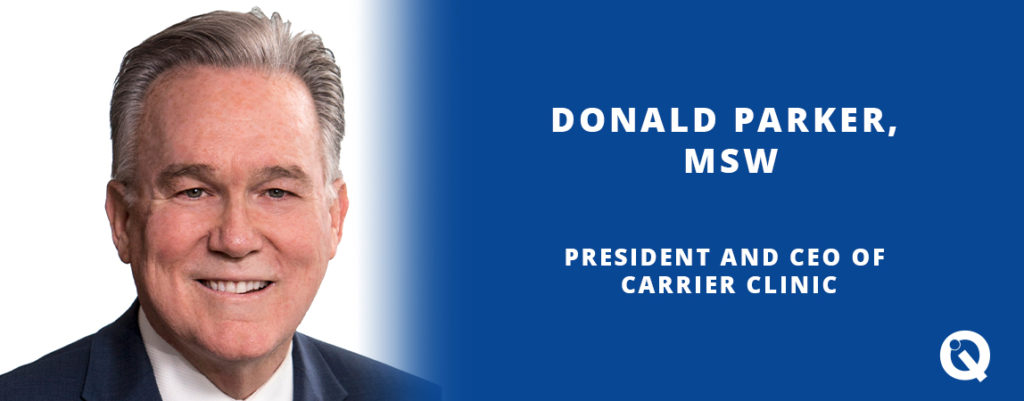Donald Parker, MSW, President and CEO of Carrier Clinic. Parker addressed the need for more mental health services in New Jersey and other issues in the field in this newsletter’s Take Five interview.
What drew you to lead an organization that specializes in psychiatric and addiction medicine?
My academic background has been in social work, and I’ve been working in health care for 40 years and behavioral health for 25 of those years. I read a book called Halftime, by Bob Buford, and the author’s premise is that the first half of your life is about building success, and the second half is about building significance. I was 60 when I wrote to him asking ‘What about those of us in ‘overtime’?” We exchanged letters about late career changes and Bob ended up writing a book called, Finishing Well – The Adventure of Life Beyond Halftime. At this stage of my career, I felt I could find significance by going back into behavioral health. The field has suffered from over a century of stigma, neglect, a lack of development. It’s a disease state where you have a conversation about relapses being a part of your treatment. In what other disease state do you introduce relapse as part of your treatment? Or is relapse introduced because of the ineffectiveness of our treatment modalities? I want to help change that.
Carrier Clinic is now part of Hackensack Meridian Health. What are the benefits and opportunities of being part of the large health care system?
We’ve just begun to identify benefits, and there are many more to be discovered. Carrier Clinic has a 110-year history and significant expertise in geriatrics, adolescents, and dual diagnoses … all different behavioral health specialties. Hackensack Meridian Health (HMH) is a system with 16 hospitals and everyday in a system like that your emergency room has multiple people who are suffering from one of those psychiatric maladies. I know that we are a benefit to HMH as an immediate referral source.
And we’ve gotten enormous support from being a part of HMH’s educational efforts. Having medical students rotating through Carrier Clinic in psychiatry will help the shortage of physicians in behavorial health. Financially, we now have support for upgrading our facility, more educational opportunities for staff, changing and improving all of our operational and clinical activity — and bringing costs down in every area you can imagine because of their access to buying power and their expertise in managing effectively and efficiently. The intellectual and innovative activity involved in a large health system is available to us in the snap of a finger. … Here’s another example. Through HMH, we’re creating a medically integrated Behavioral Health Urgent Care Center in Neptune, across from Jersey Shore University Medical Center. It’s the first of its kind in the nation that we know of.
Can you share some of your ideas of how we can address the state’s shortage of mental health providers?
First we need to expose medical students to the field and create financial incentives to those who go into psychiatric residency programs. We’re doing that now with the Hackensack Meridian School of Medicine at Seton Hall University. The medical students who rotate through Carrier Clinic get significant exposure to the psychiatric field, as well as rotations through other parts of the psychiatric system in HMH. Secondly, if those students go into a residency sponsored by HMH they can complete their medical school a year earlier and shave off an entire year’s tuition. We now have 30 residency slots in psychiatry. We also have behavioral health fellowships in child and adolescent, geriatric, and addictive medicine. There’s a continuum of opportunity from when you enter medical school to your selection of a medical specialty, all involving Behavioral Health.
Carrier Clinic has been a member of the Quality Institute since 2014. How does being a member benefit your organization?
It’s similar to being part of Hackensack Meridian Health. We have the opportunity to be around extremely smart people who are addressing the challenges in our field, and in related fields — solving problems, getting information, mentoring, and collaborating on projects. It’s a significant advantage. The Quality Institute literally brings to our doorstep experts in multiple areas, such as patient safety, improving clinical outcomes, and reducing costs.
Can you tell us something about your life outside of the working world? Where might we find you on a sunny day when you are not working?
I’m a naturalist who enjoys New Jersey nature. I am canoeing, kayaking, and hiking throughout New Jersey. At Carrier Clinic, I’ve made it a point to bring nature into and around Carrier Clinic. We have horses for equine therapy. We have goats, and we have peacocks for their beauty. We’ve embedded all kinds of animals into our daily routine. We have on our campus 350 natural acres that we zealously protect. We also have a 14-acre solar farm. We use light throughout our campus to create a healing environment for our patients. That’s all informed by my own reverence for and engagement with the outdoors.

